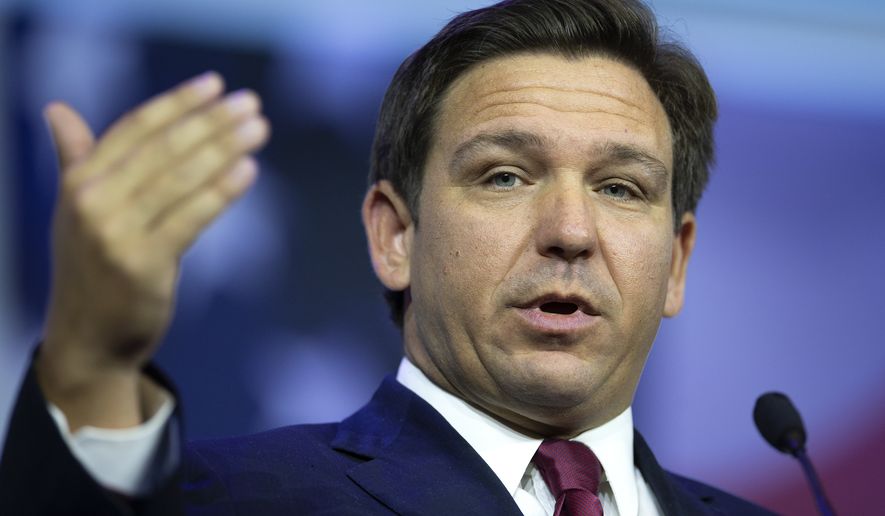Florida Gov. Ron DeSantis on Wednesday proposed legislation that would ban critical race theory in K-12 schools, a measure that would codify the intent expressed by the state Department of Education earlier this year.
Mr. DeSantis, a Republican, said his legislation — the Stop Wrong Against Our Kids and Employees Act, or the Stop Woke Act — would involve more than simply codifying the earlier decision by Florida’s Education Department.
The legislation, which is still being crafted, would extend the ban to the workplace, providing a legal recourse to those who feel various corporate training policies or seminars have led to discrimination, according to Mr. DeSantis’ staff.
The ban also would apply to applications of The New York Times’ “1619 Project,” a Pulitzer Prize-winning series that sought to make slavery the centerpiece of America’s founding.
“We are going to be … giving parents a private right of action to be able to enforce the prohibition on CRT, and they get to recover attorney’s fees when they prevail, which is very important,” Mr. DeSantis said at a press conference. “A lot of times these people will fear lawsuits more than a fine from the state Department of Education.”
Critical race theory is a Marxist-rooted ideology that began in graduate schools and holds that White supremacy undergirds social action and institutions in the U.S.
The move to incorporate critical race theory into K-12 education has roiled communities in many states, leading to pushback from some parents and taxpayers. Those opponents believe critical race theory is itself racist and teaches students to mistrust one another based on skin color, gender and sexual orientation.
Florida law already requires public schools to teach topics such as slavery, the Holocaust and the Declaration of Independence.
The Stop Woke Act would not prohibit the teaching of any specific events in American history. Other states have passed laws that ban pedagogy built on critical race theory concepts, and those laws do not proscribe the teaching of any specific historical events.
“Florida’s education system exists to create opportunity for our children,” Mr. DeSantis tweeted. “Critical race theory teaches our kids to hate our country and to hate each other. It is state-sanctioned racism and has no place in Florida schools.”
Supporters of anti-racism measures maintain moves to ban critical race theory will strip from the classroom an examination of some of America’s worst sins. The nation’s two largest teachers unions, the American Federation of Teachers and the National Education Association, have thrown their support behind the anti-racism movement in schools.
Mr. DeSantis said he believes the legislative support is there for such a bill, but it remains to be seen what will transpire in Florida’s next legislative session, which begins in January and ends in March.
A legal challenge to the legislation is likely. Other states that have banned critical race theory in the classroom have seen those laws opposed in court. The American Civil Liberties Union filed a lawsuit in Oklahoma, alleging its ban would outlaw discussion of events such as the 1921 Tulsa race massacre.
Florida’s legislation would not explicitly ban any period of history, according to DeSantis press secretary Christina Pushaw.
“The narrative is that we want to ban negative parts of our history and that is just false,” Ms. Pushaw said. “At this point, it seems like it is just willful misinformation.”
The words “critical race theory” are unlikely to be included in the proposed bill, as its purpose is to outlaw teaching elements of race essentialism, she added.
“We think treating everyone equally is the opposite of discrimination,” Ms. Pushaw said.
• James Varney can be reached at jvarney@washingtontimes.com.




Please read our comment policy before commenting.